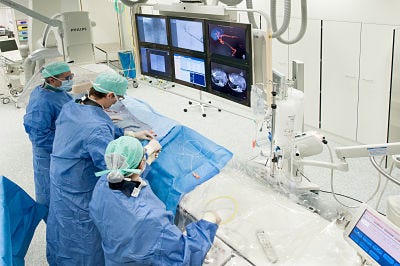New Philips Device Could Improve Cancer Treatment
September 9, 2016
The launch is the latest from Philips in a string of medical product releases aimed at making healthcare more personalized, targeted, and cost-effective
Maureen Kingsley
 Philips plans a European launch of a next-generation, interventional oncology-treatment system, with the debut planned at the Cardiovascular and Interventional Radiological Society of Europe's annual meeting (CIRSE 2016) in Barcelona next week.
Philips plans a European launch of a next-generation, interventional oncology-treatment system, with the debut planned at the Cardiovascular and Interventional Radiological Society of Europe's annual meeting (CIRSE 2016) in Barcelona next week.
The system, dubbed OncoSuite, will be used by physicians to provide both analysis and targeted, minimally invasive treatment of tumor lesions, thereby reducing damage to healthy surrounding tissue during patient treatment. The system offers clinicians a better view of treatment targets while the clinicians perform procedures, resulting in more-informed decision making.
Optimized for Liver Treatment
Jeff Geschwind, MD, chair and chief of the Department of Radiology and Biomedical Imaging at the Yale School of Medicine, explained in a Philips press release that the OncoSuite system is optimized for treating patients with liver cancer but can be used on patients with other cancers as well, including bone, kidney, and lung cancer. "Given the steady increase in the prevalence of non-alcoholic fatty liver disease and liver cancer, the development and availability of new technology is much needed to provide interventional oncologists with a breakthrough that allows best possible treatment for these patients," Geschwind said in the press release.
The OncoSuite system integrates tumor embolization and ablation procedures with Philips' interventional x-ray systems, enabling physicians to target multiple tumor lesions simultaneously. Philips boasts that the OncoSuite is the "only platform in the industry" to do so, according to the company. The system comprises an enhanced-imaging product (XperCT Dual), a live 3-D image guidance product for tumor embolization (EmboGuide), and a live 3-D image guidance product for tumor ablation (XperGuide).
"Minimally invasive, image-guided interventional oncology procedures are a highly effective option for patients who cannot be treated through conventional techniques such as surgery, chemotherapy, or radiation therapy," said Ronald Tabaksblat, business leader, Image Guided Therapy Systems at Philips, in the company's press announcement. "Interventional oncology procedures are rapidly increasing, and OncoSuite provides the first complete interventional oncology portfolio for interventional radiologists, enabling physicians to see the entire tumor and its feeder vessels to directly target treatment [while] avoiding healthy tissue."
Harnessing Sensors and Data Management Sensors and data management are changing the game when it comes to medtech product development. Learn how to use these tools to create your next winning innovation at MD&M Minneapolis on September 22. Qmed readers get 20% off with promo code Qmed16. |
To that end, the Open Trajectoryfunction within the XperCT Dual portion of the system enables better centering of the liver with significantly improved visualization of peripheral hepatic tumors in a single sweep during the procedure. This feature can effectively scan larger patients by providing a more targeted field of view. Previously, the press release states, with the traditional geometric movement of the C-arm within the interventional X-ray system, part of the liver image was cut off, and larger patients required multiple scans to visualize tumors in the periphery of the liver.
Incorporates Imaging for Radio-Opaque Bead Technology
OncoSuite also features what Philips calls "the world's first optimized imaging" for LC Bead LUMI, the result of a collaboration between Philips and healthcare-specialist company BTG that provides real-time visible confirmation of radio-opaque bead location during their use in tumor-embolization procedures. Additionally, wiper movement functionality improves workflow with automatic dual-phase imaging, helping physicians to acquire two 3-D cone-beam computed-tomography datasets at different times during the procedure in a single step.
Philips' Growing Health Tech Portfolio
Philips' 3% overall comparable sales growth was driven by a 5% growth in its health technology portfolio, according to the company's first-quarter 2016 report. The OncoSuite system is the latest of many recent product launches by Philips in the healthcare space. In August of this year the company rolled out a handful of mobile health-monitoring devices that pair with its HealthSuite app for iOS and Android platforms. These include a fitness wristwatch, an ear thermometer, a body-analysis scale, and a blood-pressure analyzer.
Earlier in 2016, Philips' Minicare I-20, a small, handheld, point-of-care heart-attack diagnostic device requiring only one drop of blood, earned the CE Mark in Europe and is now being sold in the U.K., the Netherlands, Germany, and Belgium.
Maureen Kingsley is a contributor to Qmed.
Like what you're reading? Subscribe to our daily e-newsletter.
[Image courtesy of Philips]
About the Author(s)
You May Also Like

.png?width=300&auto=webp&quality=80&disable=upscale)
